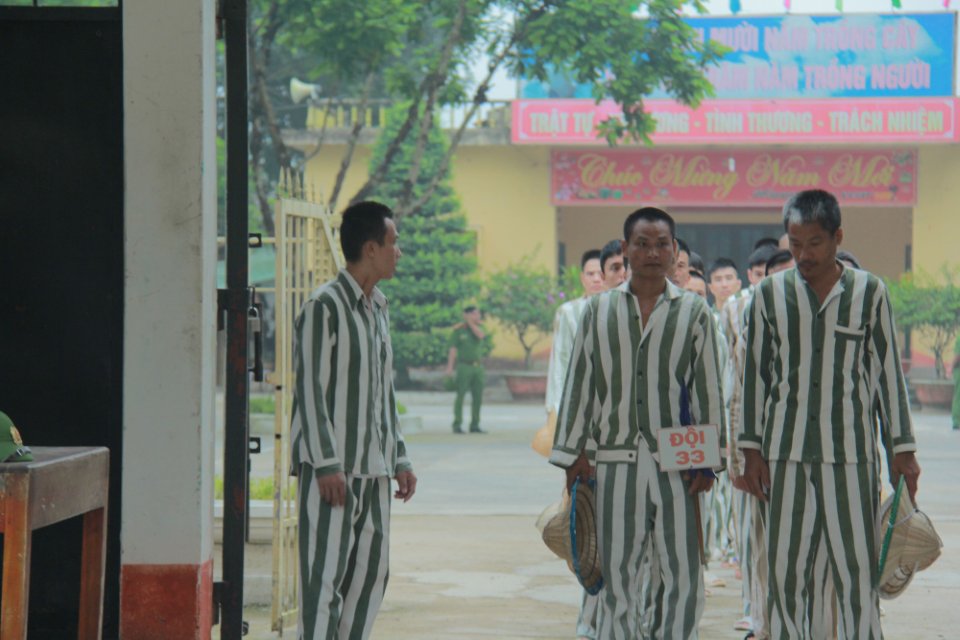The criteria for classifying the level of compliance with the sentence of imprisonment as "good" for prisoners in Vietnam
Recently, the Government of Vietnam has issued Decree 133/2020/ND-CP detailing the implementation of several provisions of the Law on Execution of Criminal Judgments.

The criteria for classifying the level of compliance with the sentence of imprisonment as "good" for prisoners in Vietnam (Illustrative image)
In Article 19 of Decree 133/2020/ND-CP, it is stipulated that prisoners in Vietnam must fully meet the following criteria for classifying the execution of prison sentences to be ranked good:
- Must meet the criteria specified at points a, c, g of Clause 2 of this Article;
- Prisoners in Vietnam must seriously adhere to all provisions at point b, Clause 2 of this Article. In cases of appealing a court's judgment or decision, or other issues related to the execution of the prison sentence, it must conform to the law;
- Must meet the criteria stipulated at point d of Clause 2 of this Article. Specifically, regarding the criterion of exceeding the labor quota or the assigned workload, if the prisoner has not met or has not regularly met this criterion, the criterion on the results of participation in education and training, the prisoner must achieve an average score or higher. Prisoners who are ill and undergoing treatment; war invalids, sick soldiers; disabled or with physical, mental deficiencies; pregnant women, on maternity leave; have children under 36 months living together in the prison; elderly men from 70 years old, women from 65 years old or older; prisoners who are frequently sick, suffer from diseases that limit their ability to participate in labor and education, are exempted or have reduced results in labor and education;
- Must meet the criteria set out at point dd of Clause 2 of this Article, however, regarding the criterion of having outstanding achievements in emulation movements, the prisoner has not met this criterion;
- Regarding point e of Clause 2 of this Article, if the prisoner belongs to cases such as having no home, unidentified relatives, ethnic minorities, living in remote areas, borders, islands with particularly difficult socio-economic conditions, they must have a commitment to overcome these issues after serving the prison sentence, confirmed by the Head of the detention facility, or the prisoner voluntarily contributes their deposit, reward money, or labor results, it is considered active mitigation of consequences.
Prisoners with particularly difficult economic family circumstances in Vietnam, where relatives of the prisoner have a petition confirmed by the People's Committee of the commune or the working agency/unit, and the prisoner commits to mitigating the consequences after serving the prison sentence confirmed by the head of the detention facility, it is considered active mitigation of consequences caused by their criminal acts. In cases where the family has economic difficulties and requests for installment payments at the detention facility, the prisoner must write a commitment, and the relatives must make a commitment about the timeline and progress confirmed by the Head of the detention facility and must deposit the money according to the commitment to be considered active mitigation of consequences. If the commitment is not fulfilled, it is not considered active mitigation of consequences. Prisoners who submit a petition about particularly difficult family economic circumstances but have a total deposit amount equal to or higher than the civil obligations that need to be fulfilled, they must be educated to commit a part for fulfillment, if intentionally not executing, it is not considered active mitigation of consequences.
Foreign nationals who have not yet mitigated the consequences caused by their criminal acts must be required by the prison warden to write a letter to their relatives, sending it to the Department of Prison Management and compulsory education institutions, reformatory schools, to be forwarded to the diplomatic or consular representative of the country of their nationality or the representative of international organizations in Vietnam for coordination in resolution.
Detailed contents can be found in Decree 133/2020/ND-CP, effective from December 25, 2020.
Le Vy
- Key word:
- imprisonment
- prisoner
- Vietnam
- Number of deputy directors of departments in Vietnam in accordance with Decree 45/2025/ND-CP
- Cases ineligible for pardon in Vietnam in 2025
- Decree 50/2025 amending Decree 151/2017 on the management of public assets in Vietnam
- Circular 07/2025 amending Circular 02/2022 on the Law on Environmental Protection in Vietnam
- Adjustment to the organizational structure of the Ministry of Health of Vietnam: Certain agencies are no longer listed in the organizational structure
- Vietnam aims to welcome 22-23 million international tourists in Vietnam in 2025
-

- Number of deputy directors of departments in Vietnam ...
- 15:04, 05/03/2025
-

- Cases ineligible for pardon in Vietnam in 2025
- 14:43, 05/03/2025
-

- Decree 50/2025 amending Decree 151/2017 on the ...
- 12:00, 05/03/2025
-

- Circular 07/2025 amending Circular 02/2022 on ...
- 11:30, 05/03/2025
-

- Adjustment to the organizational structure of ...
- 10:34, 05/03/2025
-

- Notable new policies of Vietnam effective as of ...
- 16:26, 11/04/2025
-
.Medium.png)
- Notable documents of Vietnam in the previous week ...
- 16:21, 11/04/2025
-
.Medium.png)
- Notable documents of Vietnam in the previous week ...
- 16:11, 02/04/2025
-
.Medium.png)
- Notable new policies of Vietnam to be effective ...
- 16:04, 02/04/2025
-
.Medium.png)
- Notable new policies of Vietnam effective from ...
- 14:51, 21/03/2025
 Article table of contents
Article table of contents
